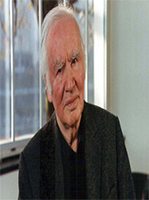



Robert JUNGK, the Austrian honorary President of the London Institute for Social Inventions, died in July 1994. This appreciation of him appeared in a longer form in the Futures Bulletin (for Dec '94) of the World Futures Studies Federation. It was written by Dr Richard SLAUGHTER.
"When Hitler came to power, Bob Jungk was a 19-year-old student in Berlin. Following the Reichstag fire he was arrested for anti-Nazi activities and deprived of his citizenship. With luck and the help of friends he was released, went to the Sorbonne in Paris, but later returned to Germany to work for a subversive press service. Before long he was forced to flee to Czechoslovakia. The fall of Prague took him to Paris and the fall of Paris took him to Switzerland. Even here he was jailed for his outspoken condemnation of the Nazis. After the war he returned to Germany, took a degree at Zurich and travelled widely.
From that time on, Jungk set his hand against oppression in all its forms. By 1952 he completed Tomorrow is Already Here, book highly critical of the emerging uses of advanced technology in America. But the focus of his subsequent work turned upon a trip to Hiroshima in the early 1950s. It was here that he met a number of people who were dying of radiation sickness. The major themes of his life's work were forcefully impressed upon him: the power and potential destructiveness of modern technologies, the corresponding need for careful foresight and the constant struggle to preserve human qualities in the brave new post-war world. His work seems to fall into perhaps three broad phases. First was the painstaking research on nuclear issues, both military and civil, emerging in books likeBrighter Than a Thousand Suns and The Nuclear State. There followed a later period spent looking for, and developing, ways of responding to the challenge. This produced The Everyman Project and, much later, Future Workshops. During this time he was one of the founders of the World Futures Studies Federation. He was the President (and one of the inspirations for) the London-based Institute for Social Inventions, now a well-established seedbed for innovative ideas. In later years he became a kind of 'elder statesman' of the futures field , and an inspiration both to fellow futurists and many other people. In the late 80s he persuaded the city of Salzburg in Austria to support the establishment of the Robert Jungk International Futures Library. Here in elegant rooms overlooking the fast, grey river that bisects Salzburg, he founded one of the great repositories of futures material in the world. He later ran for president of Austria and suffered much personal abuse.
He did as much as any, and more than most, to identify the central dangers of this most dangerous of centuries. It is therefore no exaggeration to describe him as a kind of 'one-man' revolution. Jungk's view was that if people use the powers that are available to them, then the future, as a 'place to live in', is far from being lost. He denied being an optimist, and claimed to be 'a pessimist who still believes that not everything has to be bad'. He felt that the important thing was to create contexts for social innovations; places where people can take ideas." 'From these seedbeds emerge the projects, the real practical changes that over time move our civilisation from its present self-destructive course.'
Source: http://www.globalideasbank.org/site/bank/idea.php?ideaId=145


